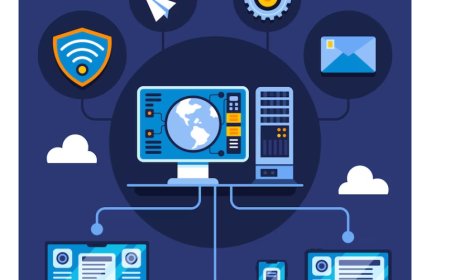Understanding Types of Cyber Security Jobs and Salary
cybersecurity jobs, salaries, skills, and certifications essential for digital protection roles. Learn about top roles like analysts, ethical hackers, and more.

Have you ever considered how important cybersecurity is to companies nowadays? I have direct experience with the value of effective digital protection for businesses of all kinds from my job. After assisting a business in recovering from a data breach, I realized how important cybersecurity experts are to maintaining data security in our digital age.
After working in cybersecurity for years, I've concluded that it's not simply defensive; it's vital. Every position, from analyst to ethical hacker, offers special abilities to protect data. Building a successful cybersecurity strategy requires an understanding of these responsibilities and how they interact.
Experts in cybersecurity stress that a competent, diverse security staff is essential. According to studies, businesses that have specialized cybersecurity positions encounter fewer, milder intrusions, safeguarding their assets and reputation. Having worked with several firms in this field, I have direct experience with how these positions foster customer confidence while guaranteeing data security and dependability in the modern digital environment.
What Is Cybersecurity?
Cybersecurity is the process of defending data, networks, and computers from intrusions or assaults. With the continual growth of cyber dangers, it is crucial to protect sensitive data, whether it be financial, personal, or business-related.
Cybersecurity encompasses a wide range of topics, from protecting online transactions to averting data breaches. In order to assist organizations and individuals stay safe in an increasingly digital environment, experts employ tools and tactics to guard against hackers, viruses, and other digital threats.
Why Cybersecurity Matters for Everyone
-
Everyone in the modern world depends on technology for communication, shopping, and employment. Cybersecurity ensures that these everyday tasks are secure by safeguarding financial and personal data online.
-
Cybersecurity protects us from dangerous dangers including fraud, data loss, and identity theft. It is necessary to safeguard our digital life from assaults that aim to compromise our data.
-
Cybersecurity is essential for organizations to gain the trust of their clients. Businesses employ robust security procedures to guarantee that client information is kept private and secure, enabling confidence in online communications.
-
Businesses may prevent costly attacks by putting effective security measures in place. For instance, companies may test and bolster protections against expensive harm and data loss by using ethical hacking.
-
Cybersecurity protects businesses' reputations by thwarting assaults that can damage their brand. Businesses show their dedication to safeguarding client information and upholding privacy by using secure systems.
-
Cybersecurity is essential in today's technologically advanced environment for both individuals and businesses. We can communicate, work, and buy with confidence and security because of the safer digital environment it offers.
Key Types of Cyber Security
1. Network Security
Focuses on protecting a computer network from attacks, whether they are deliberate or the result of malicious software. Network security is achieved by the use of virtual private networks (VPNs), intrusion detection systems, and firewalls.
2. Information Security
Data that is protected from illegal access, use, disclosure, or destruction is referred to as "infosec." It guarantees data integrity and privacy while it is being sent and stored.
3. Application Security
Defends programs and software against possible dangers. Since apps are frequently the target of attackers, this kind of security entails routinely testing and upgrading software to prevent vulnerabilities.
4. Cloud Security
Guarantees the security of data kept in cloud settings. Data privacy, access control, and data encryption in cloud-based services are the main concerns of cloud security as cloud usage continues to rise.
Protects network-connected devices like computers, smartphones, and tablets. Endpoint security uses device management software and antivirus software to protect each endpoint from threats.
6. Identity and Access Management (IAM)
Emphasizes who has access to information. IAM helps stop insider threats and unauthorized access by making sure that only authorized people may access certain data.
7. Data Security
Involves safeguarding private information no matter where it is stored. To stop unwanted access to or leaks of private data, one might use data masking, encryption, and data loss prevention (DLP) strategies.
8. Disaster Recovery and Business Continuity
Plans for data continuity and recovery to be ready for any disruptions. This kind makes guarantees that operations and data can be promptly recovered following natural catastrophes or cyberattacks.
Exploring Key Cyber Security Roles and Their Salaries
1. Cybersecurity Analyst
-
Overview: Cybersecurity analysts are the first line of defense for safeguarding the digital assets of a company. By keeping an eye on network activity, spotting questionable trends, and blocking illegal access, they guarantee data protection. People who appreciate data analysis and security-related problem-solving are a good fit for this profession.
-
Key Skills: Cybersecurity analysts must be meticulous and possess good analytical abilities. It is necessary to have some technical expertise, such as being conversant with firewalls, antivirus programs, and monitoring tools.
-
Salary Range: Entry-level cyber security analysts in India typically earn around ₹4-6 lakh per year, while experienced analysts can make ₹8-12 lakh or more annually.
2. Penetration Tester (Ethical Hacker)
-
Overview: Ethical hackers are similar to penetration testers, sometimes known as "pen testers." Their job is to try to breach a company's systems in order to test its security. They can detect and address vulnerabilities before actual hackers do by doing this.
-
Key Skills: Strong technical skills are necessary for this position, including knowledge of networks, programming languages like Python, and hacking tactics. Additionally, ethical hackers must solve problems creatively.
-
Salary Range: Penetration testers generally start at ₹5-7 lakh per year, with experienced testers earning ₹15-25 lakh or more, depending on their expertise and certifications.
3. Security Consultant
-
Overview: Security consultants provide suggestions on how to enhance security systems in a variety of enterprises. They support businesses in risk assessment, policy creation, and the introduction of new security measures.
-
Key Skills: Since security consultants frequently communicate complicated security information to non-technical individuals, they must be outstanding communicators. Additionally, they must be well-versed in cybersecurity and capable of keeping abreast of emerging dangers.
-
Salary Range: Security consultants typically earn between ₹6-10 lakh per year, with experienced consultants potentially earning ₹15 lakh or more, especially if they have a specialized skill set.
4. Incident Responder
-
Overview: When there is a security breach, incident responders move fast to minimize damage and begin the recovery process. They look into the hack, determine how the cyber threats occurred, and assist in bolstering security to fend off such assaults in the future.
-
Key Skills: Crisis management abilities are crucial in this position. Responders to incidents must be nimble and prepared to handle issues as they arise. It's also essential to understand network protocols, system analysis, and digital forensics.
-
Salary Range: Starting salaries for incident responders are around ₹5-8 lakh per year, with experienced responders earning ₹10-14 lakh or more depending on the organization and industry.

5. Cybersecurity Engineer
-
Overview: Engineers specializing in cybersecurity create and construct safe solutions for businesses. They ensure that hardware, software, and networks all cooperate to provide a secure environment. This position is appropriate for people who appreciate working with technology and making things.
-
Key Skills: Software development, network security, and problem-solving skills are necessary for this position. For cybersecurity engineers to create efficient and successful systems, they must use their creativity.
-
Salary Range: Cybersecurity engineers generally earn ₹7-12 lakh per year, with seasoned professionals making ₹15-20 lakh or more depending on the organization.
6. Chief Information Security Officer (CISO)
-
Overview: The CISO is a senior position in charge of managing the whole cybersecurity strategy of an organization. They oversee security teams, advise other executives on security, and ensure the business complies with legal obligations.
-
Key Skills: Strong leadership abilities and a thorough comprehension of security strategy are prerequisites for CISOs. Since they frequently explain security issues to the board and collaborate closely with other executives, communication skills are particularly crucial.
-
Salary Range: CISOs in India usually earn between ₹30-50 lakh per year, with salaries at larger corporations or tech firms going as high as ₹1 crore or more for experienced leaders.
7. Security Architect
-
Overview: The security structure of a company's network is planned, designed, and managed by security architects. Developing a security architecture that guards against threats and vulnerabilities is their responsibility. Strategic thinking, knowledge of blockchain on cybersecurity, and cybersecurity architecture are necessary for this position.
-
Key Skills: Strong strategic thinking, familiarity with security frameworks, and risk assessment skills are essential for security architects. Additionally, they must possess expertise in network security design and strong team-leading abilities.
-
Salary Range: Security architects typically start at ₹10-15 lakh per year, with experienced professionals earning ₹20 lakh or more, depending on company size and project complexity.
8. Forensic Analyst
-
Overview: Cybercrimes are investigated by forensic analysts who look at digital evidence to identify the origin of attacks and collect information about how they happened. To address events and stop similar ones in the future, they collaborate closely with internal teams or police enforcement.
-
Key Skills: Strong analytical abilities, familiarity with digital forensics technologies, and knowledge of evidence management are prerequisites for forensic analysts. Clear report-writing abilities and attention to detail are also critical for this position.
-
Salary Range: Forensic analysts generally start at ₹6-8 lakh per year, with experienced analysts making ₹12-15 lakh or more depending on their expertise and certifications.
Top Cybersecurity Certifications to Boost Your Career and Expertise
1. Certified Information Systems Security Professional (CISSP)
The CISSP is an internationally recognized certification for information security professionals that is provided by (ISC)². It includes important security areas including network security, asset security, and risk management.
2. Certified Ethical Hacker (CEH)
CEH, which is offered by the EC-Council, focuses on ethical hacking methods. Penetration testers, security auditors, and other professionals tasked with finding and addressing system vulnerabilities will find it perfect.
3. Certified Ethical Hacking Professional (CEHP)
CEHP is designed for anyone who wants to become proficient in ethical hacking methods. This certification is a great option for those who want to become security professionals since it offers practical expertise on defending systems against actual threats.
4. Certified Penetration Testing Professional (CPENT)
CPENT, also developed by the EC-Council, is intended for enhanced penetration testing abilities. This certification is perfect for experienced ethical hackers who want to improve their skills since it offers a thorough evaluation of penetration testing abilities.
5. CompTIA Security+
Network security, threats, and vulnerabilities are among the core cybersecurity principles covered by the entry-level Security+ certification. It's ideal for anyone just starting out in the cybersecurity field.
6. Certified Information Security Manager (CISM)
Information security governance, risk management, and incident response are all covered in ISACA's CISM, which is ideal for people in management positions and aids in the development of strong security plans.
7. Certified Information Systems Auditor (CISA)
ISACA also offers CISA, which focuses on IT assurance, control, and auditing. For professionals assessing and putting IT security procedures in place, this certification is helpful.
8. Offensive Security Certified Professional (OSCP)
The OSCP, provided by Offensive Security, is well-regarded by ethical hackers and penetration testers. Candidates for this certification must pass a practical hacking test, which is well-known for its hands-on approach.
Factors Impacting Cyber Security Salaries
1. Experience Level
Higher compensation is typically associated with more experience. As professionals acquire skills and industry expertise, senior jobs with more sophisticated responsibilities fetch greater wages than junior roles.
2. Certification and Education
Salary increases are substantial for certifications such as CISSP or CEH. Because certified professionals are valued by employers for their validated abilities, certificates play a significant role in earning potential.
3. Geographic Location
Salary levels vary by location, with tech hubs or expensive locations paying more. Due to demand and the expense of living, earnings in major cities are frequently higher.
4. Industry
Higher salaries are seen in fields like banking and healthcare that handle sensitive data. Strict rules in these areas necessitate top-tier cybersecurity, which raises wages for qualified personnel.
5. Specialization and Skill Set
Higher compensation results from specialized talents like cloud security or ethical hacking. Positions requiring specialized knowledge are appreciated since they are necessary for effective defenses.
6. Size and Type of Organization
Jobs in cybersecurity are often paid more by large enterprises and IT companies. They look for skilled workers since they have intricate systems to safeguard, and they frequently pay top people competitively.
Cybersecurity has become a vital discipline that protects crucial infrastructures, whole businesses, and individual data from an increasing number of online attacks. Each profession offers distinct talents that safeguard sensitive data and uphold confidence in our digital environment, ranging from analysts to ethical hackers. In addition to having high earning potential, a career in cybersecurity allows us to truly impact the protection of our interconnected lives. There has never been a better moment to think about a fulfilling career in cybersecurity, as the need for qualified people in this area is growing.






























































